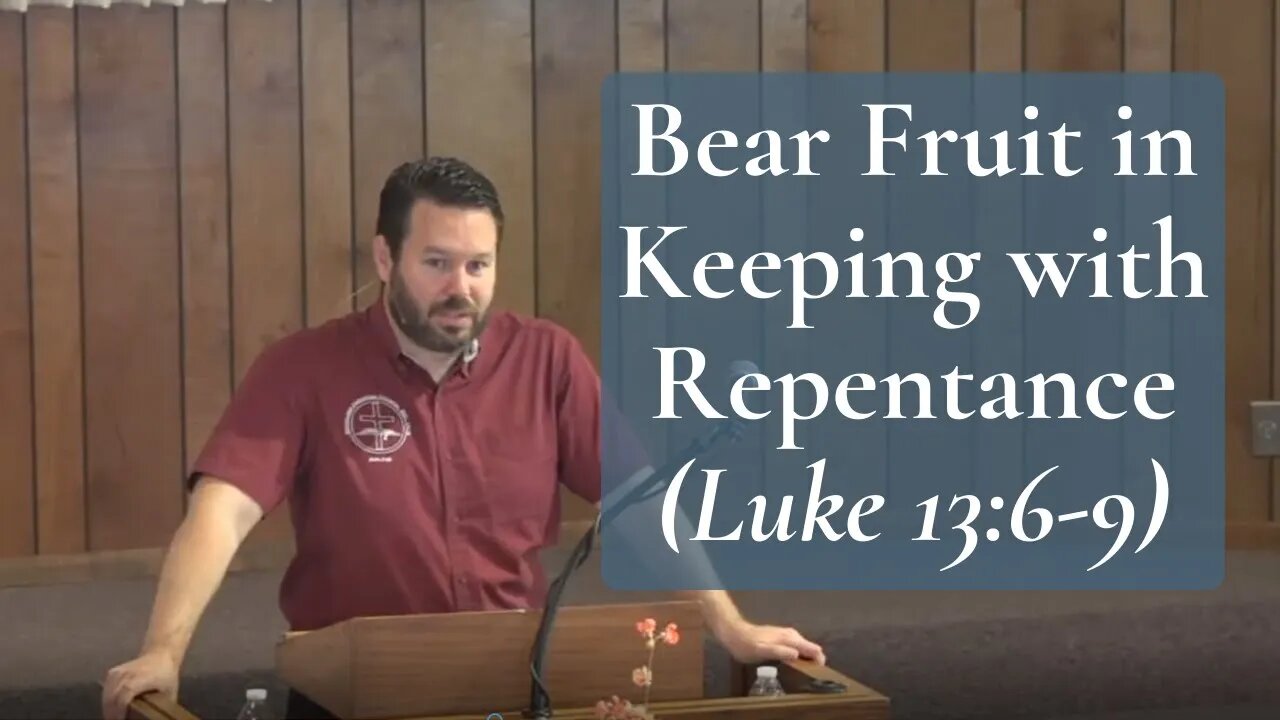Premium Only Content

Bear Fruit in Keeping with Repentance (Luke 13:6-9)
We must bear fruit in keeping with repentance. The main point of Luke 13 verses one through five is that we must repent. Jesus says, “You are looking at people who died in these tragedies and asking if they died because they are worse than everyone who lived. Instead, you should ask whether you have repented, because they perished physically, but if you don’t repent you are going to perish spiritually, or eternally.” Then Jesus adds to this in verses six through nine by talking about fruit, because if people have repented they will produce the fruit. John the Baptist said, “Bear fruit in keeping with repentance” (Luke 3:8). Jesus and John put repenting and bearing fruit together because they go hand-in-hand. Usually when we think of repentance, we think only of stopping. We should also think of starting or producing fruit. This is known as putting off and putting on (Ephesians 4 and Colossians 3).
View all of Pastor Scott LaPierre's books on Amazon: https://www.amazon.com/Scott-LaPierre/e/B01JT920EQ
Receive a free copy of Pastor Scott's book, "Seven Biblical Insights for Healthy, Joyful, Christ-Centered Marriages": https://www.scottlapierre.org/subscribe/
Here's the accompanying podcast episode: https://www.scottlapierre.org/bear-fruit-in-keeping-with-repentance/
00:00 Lessons for Bear Fruit in Keeping with Repentance
05:47 Lesson One: Repentance involves ________________ and ________________.
14:56 Lesson Two: __________ is an evidence of genuine repentance.
21:30 Lesson Three: God is patient (Part One) so we ________ ________ to repent and produce fruit.
29:59 Lesson Three: God is patient (Part Two) even when ____ __________ people won’t repent.
Family worship guide for Bear Fruit in Keeping with Repentance
Directions: Read the verses and then answer the questions:
Day 1: Luke 3:8, Ephesians 4:25-32, Colossians 3:5, 12—Why does repentance involves stopping and starting? Explain putting off and putting on. What are some examples of sins that aren’t listed in Scripture that you would stop, and what are the accompanying behaviors you would put on?
Day 2: Luke 13:6-7, Matthew 13:23, Acts 26:20, Ephesians 5:8-9, Colossians 1:5-6, Hebrews 12:11—Explain the parable of the fig tree, what the different elements represent, and the main point(s). Discuss insincere temporary repentance and sincere lasting repentance. How can we tell the difference between the two? Why is fruit an evidence of genuine repentance?
Day 3: Luke 13:8-9, Matthew 12:20, Leviticus 19:23-25, 2 Peter 3:9, paste that—Why is God patient with us? What happens if we don’t produce fruit, or another way to say it: what does it mean if a person doesn’t produce fruit? Why do you think God is patient with people even when he knows they won’t repent? Can you think of some other examples in Scripture of God being patient with people who did not repent?
For Scott LaPierre's conference and speaking information, including testimonies, endorsements, and contact info, please visit: https://www.scottlapierre.org/conferences-and-speaking/
If invited for a speaking engagement, you can expect:
• Professionally prepared and delivered messages
• A handout with lessons and discussion questions
• Copies of Pastor Scott's books to offer as gifts to increase registrations (if you desire)
• Advertising of your event on Scott's website and social media (if you desire)
• Facebook ads and/or a Facebook event page so the event can serve as an outreach (if you desire)
• Prompt responses to any communication
• Prompt replies to phone calls, emails, and/or text messages
-
 2:10:37
2:10:37
Tundra Tactical
7 hours ago $20.12 earned🔫 World's Okayest Firearm Live Stream: GunCon Drama, NFA Smackdown & Silly 2A Games! 💥
58.7K1 -
 5:13:54
5:13:54
Cripiechuccles
8 hours ago😁💚💙SHATTERDAY WITH CRIPIE💚💙RUMLUV ACTIVATE👌COME IN AND SAY HI!!:😁
17.6K1 -
 2:41:03
2:41:03
DLDAfterDark
6 hours ago $6.43 earnedLet's Talk Suppressors! Feat. Mike From CMMG! The After Hours Armory!
29.3K -
 9:37:22
9:37:22
Reolock
10 hours agoWoW Classic Hardcore | Level and CHAT | RTMP
17.2K1 -
 8:00
8:00
MattMorseTV
11 hours ago $16.27 earnedHe just lost EVERYTHING.
45.9K42 -
 4:42:20
4:42:20
FusedAegisTV
11 hours ago$1000 Fortnite Tournament | 19 TEAMS!! #RumbleGaming
50.1K2 -
 3:05:57
3:05:57
Shawn Cav Live
6 hours agowarzone and splitgate | SCL 07.05.25
32.2K -
 1:50:28
1:50:28
Omar Elattar
3 days agoI Asked a $40M Ex-Cop How He Built His Business After DUI & Rehab!
43.1K1 -
 1:10:41
1:10:41
Dad Dojo Podcast
2 days ago $2.00 earnedEP38: SCAMMED
33.4K1 -
 3:09:47
3:09:47
Mally_Mouse
11 hours agoSpicy Saturday!! - Let's Play: Power Wash Simulator
34.3K3